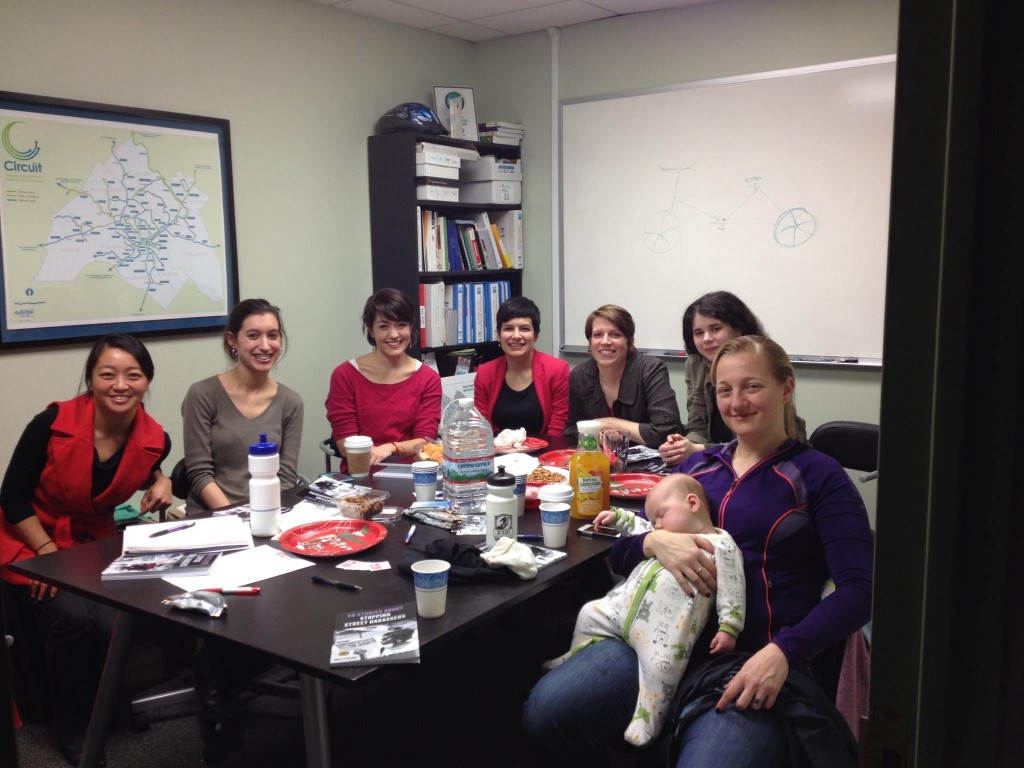Katie Monroe, Philadelphia, PA, USA, SSH Blog Correspondent

This past week I had the opportunity to help orchestrate a focus group for the national study on street harassment currently being conducted by Stop Street Harassment. When Holly asked if I thought Philly bicyclists might make a good “group” for her study, I wasn’t completely sure if I could pull enough interested folks together on short notice. But I sent out a quick email to a small group of women bicyclists I know through Women Bike PHL (the women’s bicycling program I run at the BCGP) – and got an overwhelming response. At 6 p.m. this past Tuesday, almost everyone I emailed showed up to the Bicycle Coalition of Greater Philadelphia office to take part in the focus group – the first of its kind, as far as I am aware. The hour that followed was full of insights that are still bouncing around on my brain, but here are three reflections I felt most compelled to share:
1) While I took care to distinguish between gender-based and transportation-based harassment in my last post, the focus group reintroduced some gray areas to my thinking. Car-on-bike harassment can and does certainly take place with every combination of genders of driver and cyclist, and there can be situations of car-on-bike harassment that simply involve an assertion of power over lane space and nothing more. However, I got the sense in the focus group that for women, harassment because they’re riding a bike can often become increasingly gendered as a situation escalates – for instance, getting called a cunt or bitch by an aggressive driver was a common theme. In addition, it was pointed out that while there may be important distinctions between the two types of harassment, the “gut feeling” women get from being sexually street harassed is a very similar “gut feeling” to the one they get from an aggressive driver. Good food for thought.
2) A great point resurfaced in the focus group that I remember a few women mentioning in the Women Bike PHL Facebook page last fall. That is, the fact that harassment is a reason that people (particularly women) might choose to run a red light rather than waiting for the green at an intersection, even if they generally abide by traffic laws. When we talk in the bike community about following the rules, I don’t think we often acknowledge the different ways that folks of different gender and sexual presentations experience being still versus in motion on our streets and sidewalks. A woman standing with her bicycle waiting for a green light is a sitting duck when it comes to harassment – and when the choice is between standing and taking it or looking both ways and pedaling through the red, it’s hardly surprising that some women would choose to pedal on! I think this aspect of the experience of biking isn’t always understood widely within the bike and bike advocacy community, and it seems important to me.
3) In that vein, the whole conversation just made me realize even more deeply how much street harassment and transportation choices are fundamentally linked. I saw a lot of light bulb moments happen during the focus group – for me and for the rest of the attendees. It was fascinating to hear the stories of how bicyclists – who have made a very particular and still relatively rare transportation choice, to ride a bicycle – perceive their experiences of street harassment. A few of the varied perspectives: biking as a means to escape the harassment that walking entails, biking creating safer ways to interact with strangers because of increased speed, or biking entailing sacrificing the opportunity to tell off street harassers in a satisfying manner. And I’m sure that’s only the beginning!
I’m excited to read the report and hear what resonated with Holly about our discussions on Tuesday, and to read the report as a whole with questions of transportation in mind. I’m so glad I could contribute to this study in my own way and so grateful to the group who came out to discuss this topic – thank you!
Katie Monroe founded the Women Bike PHL campaign at the Bicycle Coalition of Greater Philadelphia and she works at the Philly nonprofit Gearing Up, which gives some of Philadelphia’s most marginalized women – those in transition from incarceration, addiction, and/or abuse – the opportunity to ride bicycles for exercise, transportation, and personal growth. Follow her on Twitter, @cmon_roe.
